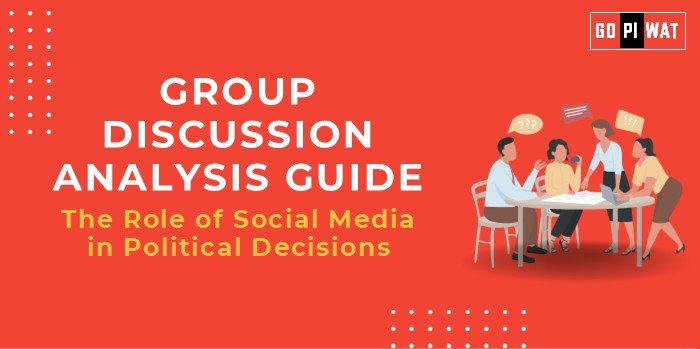📋 Group Discussion (GD) Analysis Guide
🌐 Introduction to the Role of Social Media in Influencing Political Decisions
- 💡 Opening Context: Social media platforms, like Twitter and Facebook, have transformed into powerful tools for political discourse, election campaigning, and policy-making influence. Their influence spans global movements, elections, and public policies.
- 📜 Topic Background: With over 4.8 billion users globally as of 2024, social media has evolved from a networking medium to a significant political force. Platforms have been instrumental in events like the Arab Spring, the Cambridge Analytica scandal, and real-time electoral strategies.
📊 Quick Facts and Key Statistics
- 🌍 Global Social Media Users: 4.8 billion (2024) – Illustrating the vast outreach of political messaging.
- 🇮🇳 India’s Social Media Users: 900 million – A critical tool in the world’s largest democracy.
- 💰 Election Campaign Spending on Digital Platforms: $3 billion globally (2023) – Highlights the priority given to digital campaigns.
- ⚠️ Fake News Impact: 68% of users in a 2023 Pew Research survey believe social media spreads misinformation.
- 📈 Hashtag Movements: Over 20 million tweets during #BlackLivesMatter (2020), showing issue-based mobilization power.
👥 Stakeholders and Their Roles
- 🏛️ Governments: Use platforms for announcements, engagement, and surveillance.
- 📊 Political Parties: Leverage analytics for targeted campaigns.
- 🗣️ Citizens: Active participants shaping public discourse.
- 🤖 Tech Companies: Algorithms prioritize certain content, influencing visibility and reach.
- 📰 Media Outlets: Amplify social media trends, creating larger narratives.
🏆 Achievements and Challenges
✨ Achievements
- 📢 Increased Political Participation: Campaigns like #MeToo and #FridaysForFuture highlight grassroots mobilization.
- 🌟 Transparency: Politicians use social media for direct communication, bypassing traditional media.
- 🗳️ Real-Time Feedback: Citizens actively engage in discussions and polls.
- 🎯 Campaigning Efficiency: Barack Obama’s 2008 digital campaign became a benchmark for political digital strategies.
⚠️ Challenges
- 📉 Misinformation: Fake news can skew political outcomes (e.g., Brexit misinformation).
- 🔄 Echo Chambers: Algorithms reinforce biases, limiting diverse viewpoints.
- 🎭 Manipulation: Foreign entities meddling in elections, as seen in the 2016 U.S. elections.
- 🌐 Digital Divide: Marginalized groups may lack access, skewing discourse.
🌍 Global Comparisons
- 🇺🇸 USA: Strong tradition of digital campaigning, as seen in the Obama and Trump campaigns.
- 🇪🇬 Arab Spring: Demonstrated the transformative power of social media in political mobilization.
💬 Structured Arguments for Discussion
- 💪 Supporting Stance: “Social media democratizes political participation, enabling grassroots activism and global mobilization.”
- ⚖️ Opposing Stance: “Algorithm-driven biases and misinformation undermine democratic processes.”
- 🤝 Balanced Perspective: “While social media empowers participation, regulatory measures are essential to mitigate manipulation.”
📚 Effective Discussion Approaches
- 📊 Opening Approaches:
- 📜 “Nearly 70% of political campaign budgets in India go to digital platforms.”
- 📜 “The Arab Spring demonstrated the transformative power of social media.”
- 🔄 Counter-Argument Handling:
- ⚠️ Challenge: Spread of fake news.
- ✅ Response: Solutions like stricter moderation policies and civic education can address this issue.
🔎 Strategic Analysis of Strengths and Weaknesses
- 💪 Strengths: Wide reach, real-time interaction, cost efficiency.
- 🛑 Weaknesses: Spread of fake news, digital divide.
- 🌟 Opportunities: AI-driven moderation, civic education campaigns.
- ⚠️ Threats: Cybersecurity issues, foreign interference.
🎓 Connecting with B-School Applications
- 📊 Real-World Applications: Use social media analytics in courses on marketing or digital strategy.
- ❓ Sample Interview Questions:
- 📜 “How can political campaigns ethically utilize social media?”
- 📜 “What lessons can businesses learn from social media’s influence in politics?”
- 📋 Insights for Students:
- 🔍 Explore the use of data-driven insights in decision-making.
- 💻 Understand ethical implications of digital strategies.


